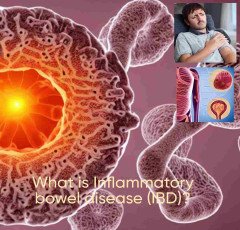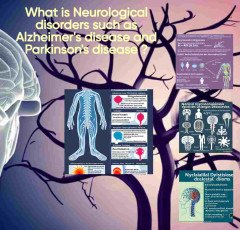
What is Inflammatory bowel disease (IBD) ?

The digestive system becomes inflamed as a result of the chronic condition known as inflammatory bowel disease (IBD).
IBD is primarily divided into Crohn's disease and ulcerative colitis.
Deep ulcers and fissures can develop in the intestinal wall as a result of Crohn's disease, which can affect any area of the digestive tract, including the mouth and the anus. On the other hand, ulcerative colitis only affects the colon and rectum and results in shallow ulcers on the lining of the colon.
Abdominal discomfort, constipation, rectal bleeding, exhaustion, weight loss, and malnutrition are just a few of the symptoms that can be brought on by ulcerative colitis and Crohn's disease, respectively. IBD may also result in side effects such colon cancer, intestinal blockage, abscesses, and fistulas.
IBD is frequently treated with anti-inflammatory drugs including corticosteroids, immunomodulators, and biologics because it is thought to be brought on by a mix of hereditary and environmental factors. To remove intestine that has been harmed or infected, surgery may occasionally be required.
IBD is a difficult and unpredictable condition, and each individual will experience it differently.
While some may have persistent symptoms that necessitate continuous treatment, some people may go through periods of remission during which they have few or no symptoms.
IBD cannot be cured, but with good management, most sufferers can have active and fulfilling lives.
The standard course of treatment includes a mix of drugs, lifestyle modifications, and, occasionally, For those with IBD, dietary adjustments may be helpful in addition to medical care.
Some people may discover that specific meals, such as dairy products, foods high in fiber, or spicy or fatty foods, make their symptoms worse.
A customized diet plan can be created by identifying trigger foods with the aid of a food diary and consultation with a registered dietitian.
In general, managing IBD calls for constant communication and teamwork between the patient, their healthcare provider, and other members of their medical staff.
Most IBD patients can control their symptoms and lead fulfilling lives with the correct support and care.
IBD patients must focus their mental health as well because the condition can be stressful and have an adverse effect on their quality of life.
Abdominal pain, diarrhea, and weariness are some symptoms that can be difficult to manage and may even lead to anxiety or depression.
Individuals with IBD may find it beneficial to connect with people who share their experiences and learn coping mechanisms through counseling
and support groups. Maintaining a healthy lifestyle is also crucial, including regular exercise, enough sleep, and stress management skills.
IBD sufferers may also need to exercise particular caution when it comes to their medical care.
It may be required to regularly screen for colon cancer and receive infection-prevention shots. Additionally, IBD sufferers may need to avoid treatments or medications that can make their symptoms worse.
It's crucial to discuss IBD with your healthcare physician if you have any suspicions.
Early detection and intervention can lessen complications and enhance results. Working closely with your medical team and implementing lifestyle adjustments can help you manage your symptoms and enhance your quality of life if you have previously received an IBD diagnosis.
IBD sufferers should be aware that their illness may call for continual monitoring and modifications to their medication regimen.
As symptoms evolve over time, it may be necessary to modify or replace drugs according to their efficacy or side effects.
It is more crucial for individuals with IBD to be honest with their healthcare practitioner about their symptoms, worries, and inquiries.
It may be helpful to keep a symptom journal and bring it to appointments to get a better understanding of how the condition is impacting you.
IBD is a chronic illness that can have a major negative influence on a person's quality of life.
But with the right management, the majority of IBD sufferers are able to control their symptoms and have happy, fulfilling lives.
Typically, medication, dietary modifications, and occasionally surgery are used in conjunction for treatment. In order to properly manage their symptoms, patients with IBD must prioritize their mental health, be open with their healthcare practitioner, and adjust their lifestyles as needed.
It's important to note that new treatments and drugs are being created, and research into the causes and cures of IBD is ongoing.
The involvement of the gut microbiota in the onset and treatment of IBD has drawn more attention in recent years. The trillions of bacteria that inhabit the digestive tract are referred to as the gut microbiome, and it is essential for controlling the immune system and preserving gut health.
The management of IBD symptoms may benefit from some probiotics and prebiotics, according to recent studies, and fecal microbiota transplantation (FMT) is being researched as a potential treatment for some forms of IBD.
To ascertain the security and effectiveness of these methods, however, more study is required.
New drugs and therapies for IBD are now undergoing clinical trials, including targeted medicines that attempt to lower inflammation without impairing the immune system. These developments show promise for bettering IBD patients' results and lowering the demand for surgery.
Even though IBD can be a difficult condition to manage, continuous research and improvements in therapy offer promise for better results and a higher quality of life for those who have the disease.
To be aware that a person's social and emotional health can be significantly impacted by IBD.
People with IBD may suffer with emotions of anxiety, despair, or shame related to their symptoms. Living with a chronic ailment can be stressful and isolated.
People with IBD may find it beneficial to connect with others who share their experiences and learn coping mechanisms through counseling and support groups.
Social media and online networks can also offer a sense of belonging and support.
In order to spread knowledge about IBD and foster understanding and compassion for those who are afflicted by the condition, education and advocacy are also essential.
There are numerous organizations and advocacy groups that can offer information, education, and advocacy opportunities to help persons with IBD and their families.
IBD management calls for a wholistic strategy that takes into account the disease's social, emotional, and physical dimensions.
For those who are impacted by IBD, improvements in research and treatment offer promise for better outcomes and a higher quality of life, and advocacy and education are crucial for fostering understanding and support within the IBD community.
Should understand that although having IBD can be difficult, it does not determine a person's identity or value.
IBD sufferers bring special skills, abilities, and experiences to their communities and to society at large. People with IBD can develop a sense of purpose and fulfillment that transcends their condition by concentrating on their talents and passions.
IBD necessitates a cooperative and multidisciplinary approach involving medical professionals, patients' families, and the larger society.
Most people with IBD are able to enjoy full and fulfilling lives, pursuing their goals and dreams while managing their condition, with the right care and support.
IBD sufferers should be actively involved in their care and treatment.
This could entail doing as much research as possible on their disease and available treatments, speaking up for their wants and preferences while speaking with their healthcare professional, and asking questions.
Those who have IBD may also find it beneficial to keep a notebook of their symptoms, triggers, and medications in order to spot patterns and decide on their care in advance.
Self-care and stress-reduction practices, such as exercise, mindfulness, and pastimes that encourage relaxation and enjoyment, should be prioritized for those with IBD. These pursuits can lessen the damaging effects of stress on the body and mind while enhancing general wellbeing.
IBD requires constant management and assistance, but most people with the condition are able to control their symptoms and lead fulfilling lives with the help of a cooperative and proactive attitude. People with IBD can thrive despite their disease by emphasizing their physical, mental, and social well-being and speaking out for their needs and preferences.
Additionally, it's crucial to remember that some lifestyle choices may have an impact on the intensity and frequency of IBD symptoms.
For instance, a diet low in fat and processed foods and high in fiber may help control symptoms and improve gut health. It's crucial for persons with IBD to give stress management, good sleep hygiene, and quitting smoking first priority. Stress, lack of sleep, and smoking can all aggravate symptoms.
For persons with IBD, routine medical exams are essential to monitor their illness and spot any potential problems or changes in symptoms.
To monitor their status, people with IBD may require routine colonoscopies, imaging studies, or other diagnostic procedures.
Surgery may occasionally be required to treat IBD symptoms or side effects, such as intestinal blockage or malignancy.
Surgery is, however, often viewed as a last resort when all other therapeutic alternatives have failed.
IBD necessitates a comprehensive and team-based strategy that includes self-care, dietary changes, and healthcare professionals.
People with IBD can control their symptoms and preserve their general wellbeing by placing a high priority on gut health, stress reduction, and routine medical exams.
People with IBD need to have access to supportive services and tools to help them manage their condition, as well as cheap and high-quality treatment.
IBD may be an expensive and burdensome condition, and for many people, access to treatment and drugs can be a major barrier.
In order to advocate legislation and programs that support access to healthcare and research funding, advocacy and education activities can help increase public awareness of the difficulties facing the IBD community. Online resources, counseling, and support groups can all offer beneficial connections and assistance for people with IBD and their families.
It demands a complex strategy that takes into account the condition's social, emotional, and physical elements. People with IBD can control their symptoms and have satisfying lives by cooperating with medical professionals, loved ones, and the larger society.
Despite the fact that IBD can be a difficult and lifelong condition, there have been numerous encouraging advances in research and therapy that give hope for better results and a higher quality of life.
Anti-TNF drugs, for example, have transformed the way IBD is treated and have been proven to help many patients achieve and maintain remission.
Emerging medicines are also showing promise in clinical studies and may provide new treatment choices.
Examples include stem cell therapy and microbiome-based therapies.
Additionally, studies are being conducted to better comprehend the root causes of IBD and find biomarkers that can forecast how the condition will develop and how well a given treatment will work.
Understanding the underlying causes of IBD will help researchers create more individualized, targeted treatment plans that can enhance results and minimize negative effects.
Although IBD can be a difficult condition to manage, breakthroughs in research and therapy are giving patients with IBD hope for better outcomes and a higher quality of life.
In order to improve the lives of those who are impacted by IBD, campaigning and support for research and the development of treatments must continue.
It's also critical to remember that IBD can have a major influence on mental health and that anxiety, depression, and other mental health issues are frequently experienced by persons with IBD. The uncertainty and unpredictability of IBD can be particularly difficult, and living with a chronic ailment can be isolated and frustrating.
IBD sufferers should prioritize their mental health and look for assistance if they need it.
This could entail speaking with a mental health expert, joining a support group, or getting in touch with people who have gone through comparable struggles.
The effects of IBD on mental health should be recognized by healthcare professionals, who should also include mental health screening and assistance in their treatment regimens. Healthcare professionals are better able to treat and support patients with IBD by addressing both the physical and emotional elements of the condition.
In order to effectively treat IBD, healthcare professionals must prioritize the needs of their patients.
This entails collaborating with patients to create a treatment plan that is suited to their particular requirements, preferences, and objectives.
In order to enable patients to manage their disease, it also entails listening to their worries and offering support and knowledge.
Treatment adherence, patient happiness, and health outcomes can all be enhanced with the use of patient-centered care.
Additionally, it might encourage patients and healthcare professionals to work together more effectively.
Help improve access to care, support initiatives to enhance research, treatment, and education about IBD among the larger community.
This can involve supporting initiatives for education and awareness that lessen stigma and increase understanding of IBD, as well as legislation that support research funding and healthcare access.
IBD sufferers, medical professionals, and the larger society can all benefit from working together to improve outcomes and quality of life for persons with this difficult condition.
Millions of people throughout the world suffer from the chronic disorder known as inflammatory bowel disease (IBD).
Although it can be a difficult and unpredictable condition, many people with IBD are able to lead happy and meaningful lives with the right management.
The physical, mental, and social facets of the condition must be taken into consideration for IBD care to be effective.
This entails seeking assistance for mental health issues, addressing gut health and lifestyle changes, and collaborating closely with healthcare professionals to create a specific treatment plan.
People with IBD have optimism for better outcomes and a higher quality of life thanks to research and treatment advancements, but activism and support must continue if we are to progress science and expand access to care. Together, we can make a difference in the lives of IBD sufferers and advance knowledge about and support for this difficult condition.














 Online Technology Classes
Online Technology Classes  ELECTRONIC ACCESSORIES
ELECTRONIC ACCESSORIES  Artificial Intelligence
Artificial Intelligence  The Click Engine
The Click Engine  Best Home Appliances
Best Home Appliances  Sennheiser
Sennheiser  Top Rated From Amazon
Top Rated From Amazon  Creative Brief For Video Shoot
Creative Brief For Video Shoot  Acer Laptop
Acer Laptop  Best Selling Books
Best Selling Books  1150+Trendy kids coloring pages Bundle
1150+Trendy kids coloring pages Bundle  NordPass
NordPass  Amazon Best Selling Products
Amazon Best Selling Products  TitTok Revolution
TitTok Revolution  Unlimited access to classes on illustration, photography, design, film, music
Unlimited access to classes on illustration, photography, design, film, music  Only For The United States
Only For The United States  Women Fashion
Women Fashion  NordVPN
NordVPN  ASUS Laptop
ASUS Laptop  Online Marketing
Online Marketing  BEST SELLER TOP10
BEST SELLER TOP10  Hello Theme
Hello Theme  Best Robotic Vacuum Cleaners
Best Robotic Vacuum Cleaners  SEO Checklist
SEO Checklist  All Wireless Products
All Wireless Products  One World Collection
One World Collection  NordLocker
NordLocker  The Secret Email System
The Secret Email System  Best Sellers On Amazon
Best Sellers On Amazon  Hot Bags For Pain Relief
Hot Bags For Pain Relief  Smart Doorbell
Smart Doorbell  ASPINAL LONDON
ASPINAL LONDON  Men Clothing
Men Clothing  Unreal Engine 5 For Beginners Learn The Basics Of Virtual Production
Unreal Engine 5 For Beginners Learn The Basics Of Virtual Production  RPM 3.0
RPM 3.0  Favorite Company (Cuelinks)
Favorite Company (Cuelinks)  Graphics & Design
Graphics & Design  SOFAS
SOFAS 
















